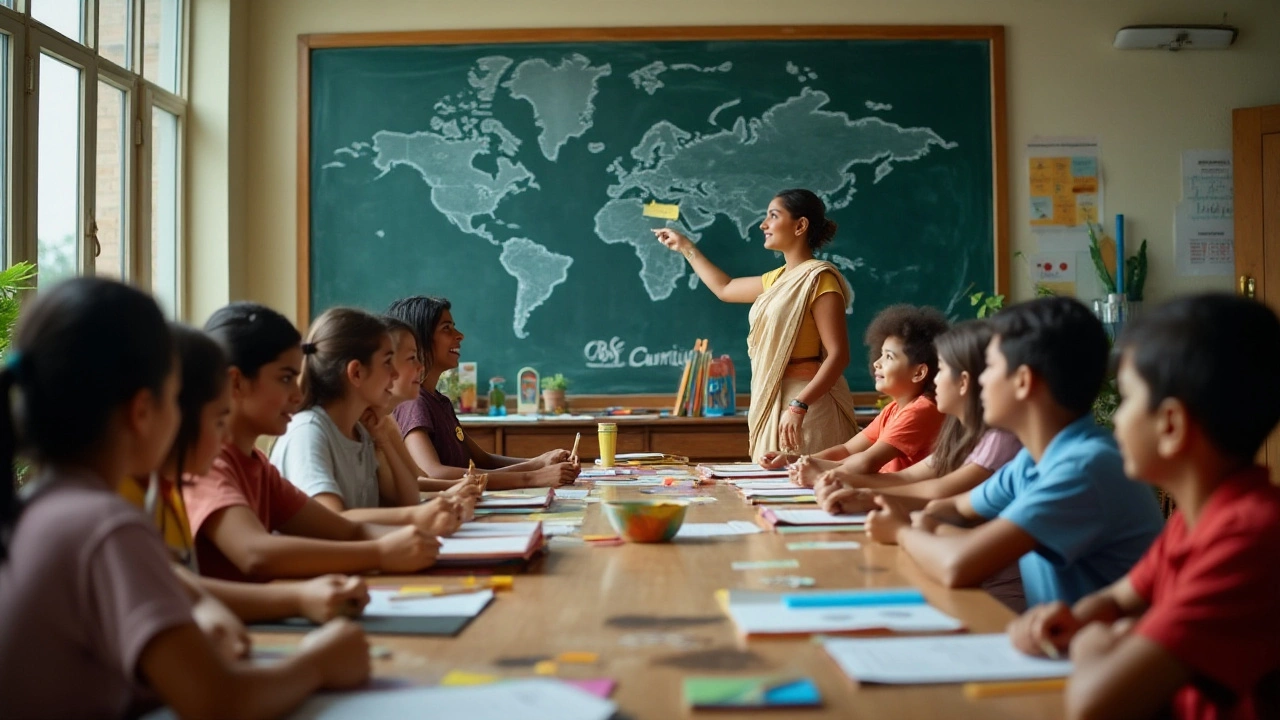The Central Board of Secondary Education, fondly known as CBSE, has long been a bastion of structured learning in India. However, its footprint isn't confined to just one country anymore. As families migrate across continents, the demand for a familiar educational framework has grown, leading to the establishment of CBSE schools worldwide.
Yet, how exactly does this Indian-born curriculum fare outside its homeland? By diving into the expansion of CBSE in various countries, we'll uncover why it's become a preferred choice for many and what unique challenges these international schools face. Whether you're a parent considering educational avenues for your children abroad or an education enthusiast eager to understand global educational trends, this exploration of CBSE's cross-border reach will illuminate the intricacies involved.
- Understanding CBSE and Its Global Expansion
- Countries Hosting CBSE Schools
- The Appeal of CBSE for International Students
- Challenges Faced by CBSE Schools Abroad
- Tips for Parents Choosing CBSE Schools Overseas
- Future Prospects for CBSE Internationally
Understanding CBSE and Its Global Expansion
The Central Board of Secondary Education, widely recognized by its acronym CBSE, serves as a cornerstone for academic excellence in India. Established in 1962, this board has systematically crafted a curriculum that balances theoretical knowledge with practical application. Known for its structured syllabus and comprehensive approach, CBSE has swiftly gained prestige, creating ripples across educational institutions worldwide. The key to CBSE’s success lies in its focus on holistic development, preparing students not merely for exams but for life. With the growing Indian diaspora, the demand for this Indian curriculum has transcended borders, initiating the global expansion of CBSE.
CBSE's global expansion was driven by the increasing mobility of Indian families, often relocated due to work opportunities. This international demand propelled private investors and educational foundations to establish CBSE-affiliated schools outside India. Interestingly, such schools are not limited to cities housing large Indian communities; they also span across cosmopolitan areas like Singapore and Dubai. These institutions deliver quality education while maintaining a sense of cultural roots for Indian expatriates. The phenomenon has seen tremendous growth; in fact, as of the last decade, there are actively affiliated CBSE schools operating in over 25 countries. This outreach reflects the influence and adaptability of the CBSE system in diverse educational landscapes.
The CBSE system is often likened to a passport, granting students the flexibility to access universities around the world, thanks to its emphasis on comprehensive assessments and robust subject matter. This adaptability provides an upper hand for students aiming to pursue higher studies in both Western and Asian universities. According to data from the CBSE board, students graduating from CBSE schools have reportedly demonstrated high acceptance rates at top global universities. In addition, a report from UNESCO emphasized the versatility of standardized curricula like CBSE, suggesting that such models can bridge gaps in international education and promote global academic mobility.
However, exporting the CBSE framework isn't without challenges. Schools must often align with local regulations, which can involve alterations to the curriculum while preserving its core standards. The quality assurance and periodic revisions by the CBSE board ensure that the curriculum remains relevant. Schools have sometimes had to incorporate language courses like Mandarin or French to cater to local needs, which enriches the CBSE experience and provides students with additional skills. Despite these adaptations, the essence of CBSE – fostering analytical thinking and problem-solving abilities – remains intact and often invites commendations from educationalists worldwide.
This global ascent of CBSE has spurred discussions among educational theorists and policymakers alike. Some argue that the expansion represents a shift towards global standardization of education, with the potential to cultivate a new era of intercultural educational exchanges. The question remains: How will CBSE's presence overseas evolve alongside emerging educational trends? One thing is clear, as noted by a prominent educationist in “The World Education Expo,” and echoed in numerous forums,
“CBSE’s approach is meticulous, striving not just for academic prosperity but aiming to develop global citizens ready to contribute effectively in an interconnected world.”
Countries Hosting CBSE Schools
As the demand for a globally recognized and structured educational framework rises, the CBSE curriculum has found its place across various countries. Embraced by many Indian expatriates and locals alike, this curriculum offers a blend of Indian educational ideals with a global perspective. Among the countries that proudly host CBSE schools, the United Arab Emirates stands out prominently. With a significant Indian population, it's no surprise that the UAE has one of the highest concentrations of CBSE-affiliated schools outside India. These schools cater to the educational needs of expatriates ensuring their children receive the familiarity of home employed with a global outlook.
Another region where the CBSE curriculum has taken root is Southeast Asia, with countries like Singapore, Malaysia, and Thailand boasting a number of international schools that have adopted it. In Singapore, the demand is driven by a thriving Indian community and a reputation for academic excellence that precedes the curriculum. Malaysia mirrors this, welcoming students from assorted backgrounds who benefit from the stringent and comprehensive nature of CBSE. This curriculum’s adaptability is particularly advantageous in multicultural societies, integrating well with diverse pedagogical approaches.
"The spread of CBSE schools across continents showcases its versatility and the thirst for quality education that resonates with Indian academic traditions," asserts Dr. Meera Singh, an education consultant based in Dubai.
In Africa, CBSE schools have found a niche in countries like South Africa and Kenya. The Indian diaspora in these regions has grown steadily, and with it, the need for educational frameworks that align with their roots. In these schools, students often appreciate not just the curriculum's rigor but also its emphasis on holistic development, preparing them for university systems worldwide. It's a testament to the curriculum's ability to maintain high educational standards while adapting to local contexts.
The expansion doesn't stop here; in the UK and the United States, pockets of CBSE schools have begun to emerge. While their numbers remain modest compared to Asian and Middle Eastern counterparts, they are pivotal for those seeking continuity in education after moving from India. In these Western countries, the integration of the Indian curriculum has opened doors to kids eager to appreciate both their cultural heritage and a globally recognized educational standard.
International schools adopting the CBSE curriculum often highlight its strong emphasis on science and mathematics. This particular focus is highly prized in regions where STEM education is prioritized. The multifaceted approach provided by CBSE equips students not only with theoretical knowledge but also practical skills that are essential in today’s tech-driven world. In a global market where education is as competitive as any industry, CBSE stands out by ensuring its students are academically robust, culturally aware, and capable of critical thinking.

The Appeal of CBSE for International Students
As the tides of globalization spread families across diverse geographies, the need for a structured and recognized educational framework becomes a beacon of stability. This is precisely where the CBSE curriculum finds its niche. For international students, especially those from Indian families, CBSE is not just a schooling system but an educational pillar that offers continuity and familiarity amidst the unfamiliar. The appeal of this curriculum lies in its robustness and adaptability, making it a compelling choice for students worldwide. One key element that adds to the curriculum’s allure is its well-laid emphasis on concept-based learning rather than rote memorization. This encourages students to engage deeply with subjects, promoting a stronger grasp of foundational knowledge which serves them well in higher education settings across the globe.
The rigor associated with the CBSE program is another significant draw for parents and students abroad. It's structured to nurture critical thinking and analytical skills, elements that are crucial in today's dynamic world. Students are required to apply what they learn to practical scenarios, allowing them to thrive outside the conventional classroom setting. This method prepares students exceptionally well for competitive exams and university entrance tests globally, which are increasingly leaning towards evaluating applied knowledge.
Education abroad often entails navigating a vast array of systems, each with its intricacies and expectations. CBSE successfully bridges these educational gaps by offering a comprehensive syllabus that aligns with international standards. The integration of Indian curriculum fundamentals with global educational concepts makes it a favorite amongst expatriate Indian communities and students from other nationalities seeking a challenging academic environment. A survey conducted by the Council of International Schools revealed that parents value the CBSE's consistency and the cultural familiarity it provides, making transitions smoother for children amid international relocations.
"The CBSE curriculum not only adheres to high academic standards but also recognizes the importance of cultural context. It is adaptable, making it perfect for our diverse global landscape," quotes a prominent educational analyst.
In many host nations, CBSE schools have partnered with local education systems, ensuring that they meet both Indian and international standards, thus gaining widespread acceptance. The multilingual approach in some CBSE schools caters to the linguistic needs of students, making it an inclusive educational option. This adaptability ensures that cultural diversity is respected while maintaining strong academic rigor, reinforcing the global applicability of CBSE credentials. A CBSE education essentially offers a ticket to many international universities, thanks to its recognized quality and assurance of student readiness for higher studies.
Challenges Faced by CBSE Schools Abroad
Many families across the globe have welcomed the inclusion of the CBSE curriculum in foreign school systems, but such integration does not come without hurdles. One of the most significant challenges faced by these schools is adapting the curriculum to suit diverse cultural contexts. Since the syllabus is deeply rooted in Indian traditions, institutions outside India often encounter difficulties in making the subjects relatable to a multinational student body. The principles and examples that resonate with Indian students might require contextualization to retain the interest and understanding of international students from varied backgrounds.
The regulatory frameworks in different countries create another level of complexity. Education systems are generally governed by strict national requirements, and these often differ vastly from one nation to another. CBSE schools must carefully navigate these regulations, which can include things like language mandates, teaching methodologies, and examination systems. Sometimes, meeting these requirements involves modifying parts of the strong CBSE framework, potentially losing some of its structured rigor in the process. Finding qualified teachers with expertise in the CBSE syllabus who are also adept at teaching in a multicultural environment adds to the complication.
Additionally, logistical challenges such as acquiring appropriate educational resources can’t be overstated. Many resources are developed in India and designed with the Indian context in mind, meaning international schools can struggle to source textbooks and learning materials that are both relevant and immediately available. Shipping delays and high costs associated with importing materials add to the difficulties. This can lead schools to develop innovative solutions, such as creating local resource materials that adapt the original CBSE content, a process that requires both time and expert input.
Furthermore, parents and students themselves often face hurdles. For families not familiar with Indian curriculum styles, the transition can be overwhelming. Academic demands and the emphasis on rote learning, which is sometimes associated with CBSE, can be quite different from the teaching practices students and parents are accustomed to. Schools often have to put in extra effort to provide orientation programs to ease the transition and ensure that students have the best chance to thrive within this system.
"Adapting CBSE globally is an enriching yet demanding endeavor. It requires not only academic alignment but cultural sensitivity and persistent adaptation," quoted an international education consultant who has worked extensively with schools in the Middle East.
Finally, the perception of the CBSE brand itself can be a stumbling block. In regions where international baccalaureates or local systems dominate, convincing families of the benefits of choosing a CBSE school requires strategic marketing and sometimes even a cultural shift in understanding education priorities. Despite these hurdles, the rigorous nature of the CBSE system provides a comprehensive educational experience that many around the world find desirable and worthwhile.

Tips for Parents Choosing CBSE Schools Overseas
Choosing the right educational institution for your child is no small feat, especially when you're living abroad and seeking schools that align with the beloved Indian curriculum. The CBSE is a popular choice for many Indian diasporas, but finding the ideal fit requires considerable thought. Delving into a school's history with the curriculum is crucial. Schools that have several years of experience with CBSE are often better equipped to handle the nuances of the syllabus. Assessing the infrastructure is equally important; modern amenities like science labs and libraries can greatly enhance the learning experience. Additionally, consider the qualifications of the teaching staff. Teachers who have trained in India or have extensive experience with the CBSE framework can provide a more authentic educational experience. When overseas, understanding the school's integration with local education regulations is also vital. Ensure the school maintains a balance between adhering to international standards and preserving the core values of the CBSE.
Communication between parents and teachers is another vital consideration. Access to regular updates and ease of communication can greatly influence your child's performance and adjustment in a new school. Some schools offer apps or portals where parents can track progress, which can be particularly helpful. If language barriers are a concern, ensuring that the school has provisions for English-speaking staff is essential. Paying attention to extracurricular activities is important as well. Programs like sports, arts, or clubs help in developing a child’s personality beyond rote learning. Reviews from other expatriate parents can also provide insights into school dynamics, which are often not apparent in brochures or official communications.
Your child’s social environment deserves close attention too. A school with a diverse student body can offer exposure to various cultures, fostering an inclusive and broader worldview. It’s worth checking if schools have provisions for festivals or cultural events that celebrate Indian traditions, helping children maintain a connection with their roots. Visiting the school in-person, if possible, can give a firsthand impression of the environment and daily workings, which might be difficult to gauge otherwise. Pay attention to the school's location as well, considering factors like commute time and transportation facilities. Some schools offer exclusive buses or shuttle services, which might be a boon for working parents. schools with CBSE curriculums sometimes include local nuances in their teaching, and understanding these adaptations can be beneficial.
"As CBSE continues to globalize, ensuring adaptation while maintaining traditional approaches is key to reaping its full benefits," says an education consultant at EduBridge.
Budgeting for tuition and associated expenses should not be overlooked. International schools often have different fee structures, and it’s prudent to understand these costs in detail. Scholarships and financial aid might be available in some schools, offering potential relief. Comparing these financial aspects across a few schools can aid in making an informed decision. Don’t forget about the transition assistance for new students. Some schools have orientation programs designed to help children adapt to a new environment, which can be incredibly reassuring for both students and parents. Building a relationship with other expat parents can also provide additional support and resources in navigating a new educational landscape. Lastly, don't hesitate to ask questions during the admission process. Knowing the answers to your concerns brings peace of mind and ensures your child’s educational journey abroad is as smooth as possible.
Future Prospects for CBSE Internationally
The future of the CBSE curriculum on the international stage presents a fascinating blend of opportunity and challenge. As global connectivity continues to rise, the demand for a unified educational standard that resonates with expatriate families and local communities alike rises as well. While the CBSE schools have initially spread to countries with significant Indian communities, there's a growing interest in places where the population of Indian expatriates is smaller but increasingly influential. For instance, in some African and Middle Eastern nations, the number of CBSE schools has nearly doubled over the past decade.
The possibility of integrating CBSE into public school systems in these nations could herald a new era for the curriculum. Some education experts believe that with CBSE's structured approach and emphasis on science and mathematics, students can gain a competitive advantage in global academic arenas. Indian curriculum has shown resilience and adaptability in diversifying its offerings. Initiatives to include more contemporary course material, such as coding and environmental science, are often praised for keeping the education system relevant in today's fast-paced world.
A challenge that accompanies this expansion is maintaining uniform teaching standards across diverse nations. Different countries have unique needs and educational requirements, which means that CBSE schools must often adapt to fulfill local government standards. This creates an interesting juxtaposition of keeping the spine of the Indian curriculum sturdy while allowing flexibility on the surface. A report by the International Education Bureau notes, "To sustain quality and growth, CBSE must establish robust international accreditation and align itself more closely with the local educational landscapes."
Potential is not only seen in traditional academic fields but also in vocational education where CBSE has taken keen steps. By incorporating skill-based learning modules into its syllabus, CBSE has broadened its reach, appealing to students aiming for a practical education that fosters employability. Schools that are already implementing these modules report higher student engagement and satisfaction. This marks a pivotal shift from purely theoretical learning to a more balanced and holistic education system, which is crucial in today’s volatile job market.
Future prospects could also rely heavily on technology integration. Many CBSE schools abroad are beginning to implement digital learning platforms to complement traditional classroom teaching. This integration allows for personalized learning paths, which could revolutionize how educational success is measured and achieved. As digital literacy becomes as important as traditional literacy, CBSE's ability to adapt will decide its position internationally. A recent survey revealed that over 70% of parents choosing education abroad for their children consider digital infrastructure a key deciding factor.
